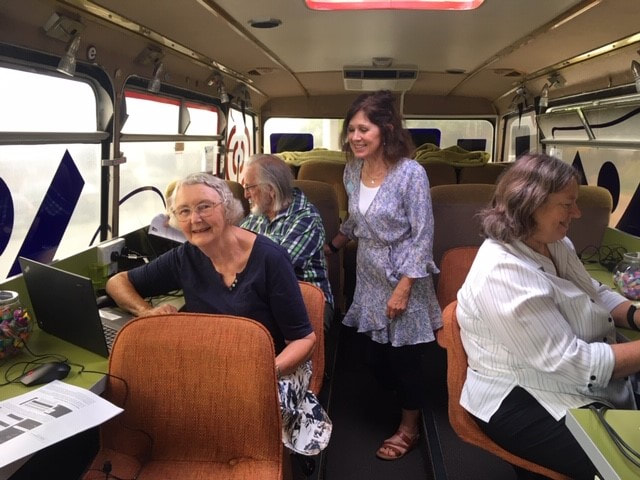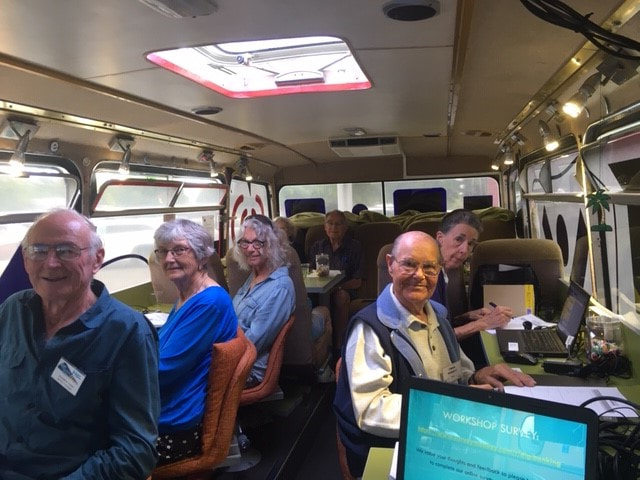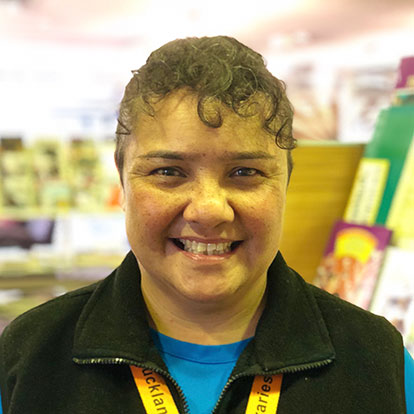Digital Inclusion and Libraries
Librarians have known the importance of digital inclusion for a long time. However, the global pandemic we are all living through has thrown into sharp relief just how vital it is. LIANZA was one of the first 20 organisations who pledged support for a digital inclusion plan submitted to the New Zealand Government by InternetNZ in May. Digital Inclusion is also identified as essential to deliver on the UN 2030 Sustainable Development Goals (see also our item on SDGs in this issue).
In this digital inclusion special Helen Heath, from the LIANZA Office, learned more about ways that librarians around New Zealand are working towards connecting and empowering their communities. She spoke with Laurence Zwimpfer, Operations Director and trustee of Digital Inclusion Alliance Aotearoa; Michelle Bryant from Nelson Public Libraries; and Leilani Glassie from Mangere East Library.
In this digital inclusion special Helen Heath, from the LIANZA Office, learned more about ways that librarians around New Zealand are working towards connecting and empowering their communities. She spoke with Laurence Zwimpfer, Operations Director and trustee of Digital Inclusion Alliance Aotearoa; Michelle Bryant from Nelson Public Libraries; and Leilani Glassie from Mangere East Library.
The Digital Inclusion Alliance Aotearoa
The Digital Inclusion Alliance Aotearoa (DIAA) is a new organisation, established in July 2018 in collaboration with the 20/20 Trust. Its aim is to expand the reach of digital inclusion initiatives, so that everyone in New Zealand has equitable opportunities to participate in the digital world.
DIAA has three initial digital inclusion programmes: Stepping Up, Skinny Jump and DORA. All of these programmes are delivered in partnership with local organisations nationwide, principally libraries.
The Alliance’s largest digital inclusion programme is Stepping Up, free community-based training that builds digital skills and knowledge in small easy steps.
Skinny Jump is a programme designed to help more New Zealanders gain access to affordable broadband at home; providing heavily subsidised connectivity to thousands of households at risk of being digitally excluded due to cost. Jump is a flexible prepaid service, offering 30GB of data for just $5, a quarter of the price of the cheapest commercial services available. Skinny Jump is closely associated with Stepping Up, with many Stepping Up partners running Spark Jump set up sessions. It shares the same coordination and support staff.
DORA is a 33-year old school bus from Central Otago that was converted into a high-tech digital learning centre for the Stepping Up training programme in 2012. From August 1 2018, responsibility for managing DORA transferred to DIAA. Laurence Zwimpfer, MNZM, is Operations Director and trustee of DIAA.
DIAA has three initial digital inclusion programmes: Stepping Up, Skinny Jump and DORA. All of these programmes are delivered in partnership with local organisations nationwide, principally libraries.
The Alliance’s largest digital inclusion programme is Stepping Up, free community-based training that builds digital skills and knowledge in small easy steps.
Skinny Jump is a programme designed to help more New Zealanders gain access to affordable broadband at home; providing heavily subsidised connectivity to thousands of households at risk of being digitally excluded due to cost. Jump is a flexible prepaid service, offering 30GB of data for just $5, a quarter of the price of the cheapest commercial services available. Skinny Jump is closely associated with Stepping Up, with many Stepping Up partners running Spark Jump set up sessions. It shares the same coordination and support staff.
DORA is a 33-year old school bus from Central Otago that was converted into a high-tech digital learning centre for the Stepping Up training programme in 2012. From August 1 2018, responsibility for managing DORA transferred to DIAA. Laurence Zwimpfer, MNZM, is Operations Director and trustee of DIAA.
|
Kia ora Laurence and thank you for talking with Library Life.
Back in April you told LIANZA: “We have been so busy responding to the huge demand for Jump since last Wednesday – over 1100 requests in just 10 days, when we normally get 2–300 a month. Librarians around the country have been absolutely fantastic in continuing to support their communities, despite the extra challenges created by COVID-19. They are continuing to accept inquiries from their communities, helping them fill in the Jump application form over the phone and then providing phone support when people ask for help when the modem arrives. Over 50 librarians have participated in our Zoom briefings this week; it has been a fast moving initiative and we are providing regular updates.“ Can you tell us how things have changed over COVID-19 lockdown? We have now reached over 4000 modems issued since March 25. This has only been achieved because librarians have remained accessible (by phone) to their communities during the COVID-19 lockdown and have continued to help people sign up for Skinny Jump. We see libraries and librarians as trusted local community connectors – bridging the chasm between real people and the incredibly confusing world of technology, people who can confidently and honestly say "trust me, this is good for you!" |
It has become increasingly obvious that going forward, post-COVID, people in NZ are even more reliant on digital connection. What would you say to individual librarians that want to get involved and make a difference?
Keep on doing what you have been doing for the last 50 years, helping people engage with and navigate the ever-changing digital world. In particular, seek out opportunities to explore new digital tools and online resources, so that you remain a trusted source of advice for the digital world. If your library is not offering Stepping Up digital literacy classes or something similar, ask your manager, why not. And embrace the digital world, not only for yourself, but for your customers.
Keep on doing what you have been doing for the last 50 years, helping people engage with and navigate the ever-changing digital world. In particular, seek out opportunities to explore new digital tools and online resources, so that you remain a trusted source of advice for the digital world. If your library is not offering Stepping Up digital literacy classes or something similar, ask your manager, why not. And embrace the digital world, not only for yourself, but for your customers.
Stepping Up & DORA
DORA the Digital Bus has been working with public libraries on a 12 month tour funded by Lotteries NZ and Kiwibank. DORA’s tour was put on hold during lockdown but is set to start back up in July. The tour started in July 2019 and will complete the tour in June 2021. DORA has toured the regions of: Northland, Whanganui, Coromandel, West Coast, Nelson and Tasman. When the tour starts back up DORA will visit: Eastern BOP, Gisborne, Hawkes Bay, Taupo, King Country, Southland and Canterbury.
Helen caught up with Michelle Bryant who worked with DORA in Nelson and Tasman back in February. Nelson Public Libraries partnered with Kiwibank and Stepping Up to hold free digital classes on online banking, and how to avoid internet scams. These classes were held in DORA the digital bus, which was parked outside each of their libraries for one week. The bus is fitted with 10 workstations, each with a refurbished laptop computer so there is no need for participants to bring their own device.
Helen caught up with Michelle Bryant who worked with DORA in Nelson and Tasman back in February. Nelson Public Libraries partnered with Kiwibank and Stepping Up to hold free digital classes on online banking, and how to avoid internet scams. These classes were held in DORA the digital bus, which was parked outside each of their libraries for one week. The bus is fitted with 10 workstations, each with a refurbished laptop computer so there is no need for participants to bring their own device.
|
Kia ora Michelle, I guess it seems a long time ago and a different world since you ran your classes on DORA back in February? Yes, it is a different world, but in some ways, not. We have still been working from home during the lockdown giving support for customers over the phone, helping with eBook downloads for example. Can you tell our readers a little more about the classes you held? We have been providing adult learning classes for years now. We started back in 1998 helping people set up email accounts, in 2005 we built a learning centre with dedicated computers and screens. APNK has really changed the way we teach now, participants usually bring their own devices. We run 8-10 classes a term, mostly for people over 50 (depending on the subject). We run classes on using eBooks, audio books, tablets and social media privacy sessions. We also teach how to research and find trustworthy information. The classes we ran on board DORA were about internet banking. The participants sat on either side of the aisle with provided laptops and we had a large screen at the front for demonstration. We found that many of the participants were distrustful of internet banking. Often with couples only one of them used internet banking, they would rather go to a physical bank and get cash. Gosh, that really became a problem during lockdown didn’t it? Yes, that’s right. We had stayed away from teaching classes about internet banking previously for lack of a neutral platform. For these classes we used the Banqer app, which is used to teach digital banking to school children. It’s a dummy banking app that lets you practice moving money around and paying bills. We adapted it for our older clients and that format, along with some role playing, worked really well on the bus. It opened up discussions about financial scams and romance scams as well. DIAA provided us with a good PowerPoint presentation and links, we are really grateful to DIAA for organising it. |
What about SeniorNet, don’t they fill this need?
There is crossover with some of the classes that SeniorNet offers. However, you must be a paid-up member of SeniorNet to register for a course. Our classes are free and you don’t need to bring your own device. They are collaborative and supportive and often tie in well with library sources such as eLending. They are fun and you get to meet different people.
Thanks so much Michelle, best of luck with all your future classes!
There is crossover with some of the classes that SeniorNet offers. However, you must be a paid-up member of SeniorNet to register for a course. Our classes are free and you don’t need to bring your own device. They are collaborative and supportive and often tie in well with library sources such as eLending. They are fun and you get to meet different people.
Thanks so much Michelle, best of luck with all your future classes!
Skinny Jump
|
The Digital Inclusion Alliance Aotearoa recruited one of Auckland Libraries staff members, Leilani Glassie, from Mangere Central Library, for a 12-month contract to work with Auckland schools helping families connect to the internet. Her library managers refer to her as one of their stars.
Mangere East Library is one of DIAA’s top performing Jump partners, connecting more than 40 families in just over two months when they first began. Laurence told Library Life that Leilani has a particularly innovative approach to reach families who can benefit from a Jump connection. She walks around the library waving a Jump modem box (Town Crier Style) inviting families to come over to the reception desk to sign-up for Jump. ‘It always works’, said Leilani, ‘Even though we have Jump posters displayed, people are much more responsive to my personal invitation.’ Leilani also mentioned that one of the reasons Jump is proving to be so successful in Mangere is because there are so many homeless families in temporary accommodation. ‘Without an internet connection, they have almost no chance of finding a suitable home,’ she said.
Helen Heath caught up with Leilani to find out more. |
Kia ora Leilani, thanks for taking time out of your day to talk with us. You must have been very busy over the last few months!
Yes, we’ve been very busy dealing with Pasifika and migrant communities, having to set up email accounts, signing them up online and setting up Skinny Jump for them. Many families don’t know how to do these things and don’t have WiFi at home. I’ve been working from home during the lockdown, I spend a lot of time on the phone talking people through the process step-by-step. They might have the pamphlet about Jump in front of them but not understand. Often Pasifika people say they understand something to be polite but then it turns out they don’t. So, I work with them every step of the way. I often work weekends and evenings because that’s when the calls come in. We couldn’t keep up with demand at one point! We’ve been even busier during the rāhui.
Working from home must bring some challenges?
Yes, accents over the phone can be misheard and introduce spelling mistakes. I get people to text me confirmations after we speak (they often don’t have an email address) that way I have the correct spellings of their names. I try to turn around requests within 24 hours. I have a stash of modems in my home office that Laurence sent me that I can send out to them. We are lucky if families know what a modem is, the younger people often help their elders and we get there together. Often the older generation doesn’t want to learn how to do it, they just want you to get it done. They say “We trust you, just go ahead! Don’t tell me how, just get it done!” I’ll often email cc’ing in the extended family so they can help too.
How do you get the word out to people?
We have posters up in the community and in schools, a lot of people come to us through word of mouth.
What are families using their connections for?
We are helping job seekers, students doing online learning, connecting people with families overseas – technology is an intricate and important part of their lives. FaceTime with whānau has been the biggest thing for elders during rāhui.
Do you face any other challenges?
We work with lots of Oranga Tamariki kids who are constantly moving around the country from family to family. They can now take their modems with them wherever they go so they can keep connected and not have so many gaps in their learning. There are also families waiting to be placed in homes, living in lodges with their kids, waiting to be connected. To assist them we work with the families and schools together. The teachers connect with the families and send contact details to me so I can get in touch. You can tell the ones that are genuine, that need help. Sometimes the families need other help, such as food parcels so I work with the principals to make sure that happens.
Wow, you do so much more than connecting people to the internet! You must find your job very rewarding?
I believe in people and making changes, empowering them with the tools to help themselves. I love being able to make a difference and see the smiles on their faces. It has been an amazing and rewarding journey!
Ngā mihi nui Leilani, best of luck with your work at level one!
Yes, we’ve been very busy dealing with Pasifika and migrant communities, having to set up email accounts, signing them up online and setting up Skinny Jump for them. Many families don’t know how to do these things and don’t have WiFi at home. I’ve been working from home during the lockdown, I spend a lot of time on the phone talking people through the process step-by-step. They might have the pamphlet about Jump in front of them but not understand. Often Pasifika people say they understand something to be polite but then it turns out they don’t. So, I work with them every step of the way. I often work weekends and evenings because that’s when the calls come in. We couldn’t keep up with demand at one point! We’ve been even busier during the rāhui.
Working from home must bring some challenges?
Yes, accents over the phone can be misheard and introduce spelling mistakes. I get people to text me confirmations after we speak (they often don’t have an email address) that way I have the correct spellings of their names. I try to turn around requests within 24 hours. I have a stash of modems in my home office that Laurence sent me that I can send out to them. We are lucky if families know what a modem is, the younger people often help their elders and we get there together. Often the older generation doesn’t want to learn how to do it, they just want you to get it done. They say “We trust you, just go ahead! Don’t tell me how, just get it done!” I’ll often email cc’ing in the extended family so they can help too.
How do you get the word out to people?
We have posters up in the community and in schools, a lot of people come to us through word of mouth.
What are families using their connections for?
We are helping job seekers, students doing online learning, connecting people with families overseas – technology is an intricate and important part of their lives. FaceTime with whānau has been the biggest thing for elders during rāhui.
Do you face any other challenges?
We work with lots of Oranga Tamariki kids who are constantly moving around the country from family to family. They can now take their modems with them wherever they go so they can keep connected and not have so many gaps in their learning. There are also families waiting to be placed in homes, living in lodges with their kids, waiting to be connected. To assist them we work with the families and schools together. The teachers connect with the families and send contact details to me so I can get in touch. You can tell the ones that are genuine, that need help. Sometimes the families need other help, such as food parcels so I work with the principals to make sure that happens.
Wow, you do so much more than connecting people to the internet! You must find your job very rewarding?
I believe in people and making changes, empowering them with the tools to help themselves. I love being able to make a difference and see the smiles on their faces. It has been an amazing and rewarding journey!
Ngā mihi nui Leilani, best of luck with your work at level one!




